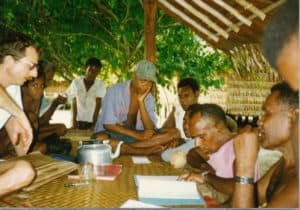As a young seminary student in the early ‘80s, John Rentz typically ended his days in “quiet times” of prayer, Scripture reading and meditation. On one occasion, the Georgia native was reading from Psalm 22 when words near the end of the chapter seemed to leap from the page.
“It said, ‘People at the ends of the earth will hear, and will praise God,’ and at that moment, I had a vision of people on an isolated island, and somebody proclaiming good news to them.
“And it was like God was saying, ‘John, you belong in that picture.’”
He wasn’t sure what to make of the image he saw in his mind that day, but he knew he wanted to obey God’s plan for his life. Eight years later, John and his New Zealand-born wife Rosalie began serving in Bible translation—on a remote South Pacific island in the Solomon Islands chain.
Launching Out
In 1987, the Rentzes arrived in the Reef Islands, on the eastern edge of the Solomons, to begin a translation project for some 9,000 Aiwoo-speakers.
Over the next six years, the couple and their daughters Elizabeth and Lucy lived in “the Reefs” intermittently for up to 10 months at a time. Working as a translation adviser to local believers, John assisted in translating portions of Genesis and later, the Gospel of Mark. They had just finished drafting the New Testament book when John received news from the U.S. that his dad was dying of cancer.
translating portions of Genesis and later, the Gospel of Mark. They had just finished drafting the New Testament book when John received news from the U.S. that his dad was dying of cancer.
The sad news was just the beginning of a series of trials that would pull the couple away from their work in the Reef Islands for more than two decades.
Bereavement and Failing Health
Assisting with his father’s care drew John and Rosalie away from the Solomons for four months. When they were able to return to their work there, any momentum they established was short-lived. A fall that shattered John’s elbow was followed by a bout with hepatitis and in 1995, the stunning news that he likely had chronic fatigue syndrome (CFS).
The Rentzes flew to New Zealand for a health leave they thought would last one year. But by 1996, John was so weak that they lost all hope of returning to their work in the Reef Islands.
“I didn’t do much of anything for two years,” John says. They did manage to visit the Reefs one last time, to pack up their belongings and say goodbye to friends and colleagues.
“I remember grieving deeply,” John wrote in a 2016 web post, “as I said goodbye to dear friends and colleagues in the islands, to my role as a translation adviser and to the village home where we had raised our two girls.
“At 38 years of age, it seemed my life had come to an end.”
New Routines
Beginning in the late ‘90s, John’s ongoing health issues led to a new assignment with Wycliffe New Zealand. Based on the country’s North Island, he was responsible for leading occasional training courses and working with new applicants to Wycliffe, while Rosalie occasionally assisted with the training courses and helped with various administrative tasks.
However, John was still keen to keep working with the Reef Island translators he and Rosalie had grown to love.
“The reality was, I couldn’t work for very many hours per week,” John says. “But I am grateful to Wycliffe New Zealand because they allowed me to keep pressing on with translation work.”
Over the next nine years, John stayed somewhat involved with the Aiwoo team through brief, sporadic visits and later, via email. And in 2004, he was well enough to return to the Reef Islands with Rosalie and their two daughters, to celebrate the dedication of Mark’s Gospel.
Tragedy Strikes
 Then in July 2016, John and Rosalie were attending a conference in Papua New Guinea when they were blindsided by a phone call from the United States: their youngest daughter, Lucy, had been hit by a truck while cycling in Denver, Colo.
Then in July 2016, John and Rosalie were attending a conference in Papua New Guinea when they were blindsided by a phone call from the United States: their youngest daughter, Lucy, had been hit by a truck while cycling in Denver, Colo.
When the Rentzes arrived in Denver a few days later, Lucy was in a coma. She had suffered severe brain damage and doctors advised the couple that Lucy would likely never regain consciousness.
After three weeks in the intensive care unit, Lucy was transferred to a hospital in Hamilton, New Zealand. Fourteen months after the accident, she took her last breath while receiving palliative care in hospital.
Grace to Carry On
For John and Rosalie, Lucy’s death reinforced their desire to return to Bible translation.
“Throughout that journey,” John says, “we were sustained by the promises of God’s Word—and especially the promises of heaven. Regardless of what happened to our daughter’s medical condition, we knew we could entrust her to our Father’s care, confident that ultimately He would provide her with a new body which would never perish.”
The couple wanted the Aiwoo people to have access to the same promises and the same hope that had sustained them through so much heartache.
“No parent should be forced to endure that kind of suffering,” says John, “without having access to those life-giving promises of God’s Word.”
In 2018, John’s health had improved enough that he was able to return to the Solomons and recommence work with the Aiwoo translation team.
“When we returned last year, I told our colleagues, ‘This was always the plan—I’m just 22 years behind schedule!’ I was planning to come back in 1996, but now I’m back. I’m working remotely, but I’m committed, God enabling.”
Passing the Torch
Despite being away from the Reef Islands for so long, John is confident that the three local Bible translators he’s helped train will keep the project moving forward. To date, the team has completed drafts of Matthew, Luke, and portions of Acts. Next, they will turn their attention to finishing draft translations of James, Ephesians and Philippians.
John is thankful that his stamina has improved significantly over the past few years. If he gets plenty of sleep, he says, he can do “pretty much anything.”
“I don’t know how long this is going to take,” says John, “but whether I live to see the whole Bible translated or not, I’m confident the Aiwoo translators will have the skills to carry on.”
New Identity
Looking back on the time he and Rosalie had to leave their Bible translation work in the Solomons, John remembers feeling “desperate” because partners in the U.S. were giving sacrificially to support their project. But at one point, he sensed God telling him it was OK that he was sick.
“That began a process of rediscovering what it means to be a child of God,” he says. “I knew what it meant to be a missionary; I had forgotten what it means to be His child.
“It was painful—I wouldn’t ever choose to go through that again. But I wouldn’t take anything in exchange for what God taught me.”

